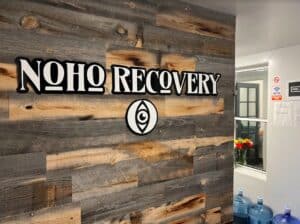Suboxone Addiction And Abuse
What Is Suboxone?
Suboxone is the brand name for a prescription medication that is designed to treat Opioid addiction. Suboxone has two ingredients: the Opioid Buprenorphine and the medication Naloxone. The combined effects of these two ingredients reduce cravings for addictive Opioids such as Heroin, Codeine, Fentanyl, and Oxycodone.
People who are undergoing treatment for Opioid addiction usually take Suboxone to manage withdrawal while they detox from Opioids. Afterwards, they often continue to use the medication to control cravings and withdrawal while they progress through therapy and rehab. Suboxone is not meant to be a cure for Opioid addiction, but rather a helpful part of the recovery process.
Suboxone is classified as a Schedule III controlled substance in the United States, meaning it’s a drug deemed to have medical value yet also carry moderate risk for addiction. As a result, only doctors who receive certifications from the Department of Health and Human Services may prescribe Suboxone. The medication is manufactured as dissolvable films and tablets.
Online Addiction Counseling
Get professional help from an online addiction and mental health counselor from BetterHelp.
- Access to Therapy 24/7
- Easy Online Scheduling
- 20,000+ Licensed Therapists
Paid Advertising. We may receive advertising fees if you follow links to the BetterHelp site.
Understanding Buprenorphine And Naloxone, Suboxone’s Two Ingredients
Buprenorphine and Naloxone are the two ingredients of Suboxone. Buprenorphine is an Opioid which is actually more potent than Morphine. However, since it’s a partial Opioid agonist, it prevents other Opioids from binding to Opioid receptors in the nervous system. In other words, it prevents other Opioids from affecting the brain. Therefore, Buprenorphine provides a way for patients to wean themselves off of Opioids while minimizing Opioid withdrawal. Buprenorphine is unlikely to cause the intense sedation and euphoria which most Opioids cause, but the drug will suppress withdrawal symptoms and satisfy basic Opioid cravings in someone with Opioid addiction.
Naloxone is a medication which reverses the symptoms of an Opioid overdose. Since Naloxone is an Opioid antagonist, it blocks and reverses the effects of Opioids on a person’s nervous system. The purpose of Naloxone as an ingredient of Suboxone is to prevent people from overdosing on the Buprenorphine. The Naloxone also minimizes a person’s risk of relapse by preventing them from experiencing the addictive and euphoric sensations which Opioids normally cause.
Is Suboxone Addiction Possible?
While Suboxone is potentially addictive, the risk of becoming addicted to Suboxone is less than the risk of becoming addicted to other Opioids. Since Suboxone is not as intensely sedative as other drugs, it is less likely to cause people to experience cravings. Buprenorphine, the Opioid ingredient of Suboxone, may provoke moderate withdrawal symptoms, specifically headaches, muscle pains, and nausea. To prevent or mitigate withdrawal, doctors tend to gradually reduce their patients’ doses of Suboxone as they progress through addiction treatment. Additionally, unlike other Opioids, Buprenorphine has a “ceiling effect.” Larger and more frequent doses of Buprenorphine will not amplify its potency. While a person can develop tolerance to Buprenorphine, they will not be able to overcome that tolerance by compulsively or repeatedly increasing how much Buprenorphine they take.
Although Suboxone addiction is unlikely, Suboxone abuse is certainly possible. Drug traffickers have been selling illegal Suboxone to people throughout the United States. In 2018, police in just one city, Cincinnati, confiscated over 6,000 doses of illegal Suboxone. Most people who buy Suboxone illegally are not trying to experience an Opioid high. Instead, they are trying to obtain relief from Opioid withdrawal. A person could misuse Suboxone by using it to relieve Opioid withdrawal without a prescription and without undergoing treatment for Opioid addiction. In such cases, a person might use Suboxone whenever they start to experience withdrawal symptoms, fail to abide by any medical limits, and suffer an overdose. When someone neglects to start treatment for Opioid addiction and takes Suboxone regularly to live without withdrawal symptoms, they become dependent on the medication and never overcome the illness. While it’s easier to just take Suboxone, recovery is the true long-term solution for withdrawal and addiction.
What Are The Side Effects And Risks Of Suboxone?
Like most medications, Suboxone can cause a variety of side effects. Most side effects are not life-threatening and usually subside within several days. The most common side effects of Suboxone include:
- Anxiety
- Depression
- Fatigue
- Fever
- Headaches
- Insomnia
- Muscle pain
- Nausea
- Sweating
Suboxone does pose a risk of more serious side effects, especially when people who are taking Suboxone also drink alcohol or use Benzodiazepines. For instance, Suboxone can provoke an allergic reaction characterized by swelling in the throat and difficultly breathing. High doses of Suboxone can also cause liver damage and induce a coma, and it is also possible to suffer a Suboxone overdose.
Looking for a place to start?
Join the thousands of people that have called a treatment provider for rehab information.
Free and confidential
Available 24/7
Access to professional treatment
What Are The Symptoms Of A Suboxone Overdose?
Since Suboxone is an Opioid-based medication, overdose is one of the most serious risks of Suboxone. In fact, an overdose on Suboxone can be lethal if left untreated. Someone who uses too much Suboxone or combines it with other drugs is more likely to suffer an overdose. The symptoms of a Suboxone overdose include:
- Anxiety
- Blurred vision
- Chills
- Confusion
- Constricted pupils
- Dizziness
- Fatigue
- Headaches
- Loss of consciousness
- Loss of coordination
- Nausea and vomiting
- Slurred speech
- Stomach pain
- Sweating
In severe cases, a Suboxone overdose can cause respiratory depression; this condition restricts or stops breathing. Respiratory depression can cause brain damage, coma, and death.
Check if my insurance covers rehab
Addiction Center is not affiliated with any insurance.
How Can I Find Treatment For Suboxone Addiction?
Suboxone is a useful medication, but everyone has to use it responsibly. It is dangerous to abuse Suboxone by taking it too often, in excessively large doses, or without a prescription. It is a tragedy that a medication which is supposed to help end addiction may also be addictive; but once someone overcomes dependence on Suboxone, they can reclaim their life from Opioids once and for all.
If you or someone you know is abusing Suboxone and needs help with overcoming Opioid addiction, contact a treatment provider today to learn more about treatment options. A treatment program for Suboxone dependence at a rehab facility will involve detox, therapy, and ongoing support in an aftercare program.
Published:
Author
Nathan Yerby

-
Nathan Yerby is a writer and researcher. He is a graduate of the University of Central Florida.
- More from Nathan Yerby
Reviewed by Certified Addiction Professional:
Theresa Parisi

Theresa Parisi is a Certified Addiction Professional (CAP), Certified Behavioral Health Case Manager (CBHCM), and International Certified Alcohol and Drug Counselor (ICADC) with over 12 years of experience in the addiction treatment field.
- More from Theresa Parisi
Sources


Recovery Starts Today
Call Now For Addiction Support



Newport Academy – Teen Rehab Center
Port Townsend , WA


Sequoia Detox Centers
Spokane Valley , WA


Moonlight Mountain Recovery – Nampa
Nampa , ID

Bayside Marin Treatment Center
San Rafael , CA

Newport Institute for Young Adults
Sunol , CA

The Camp Recovery Center
Scotts Valley , CA

Moonlight Mountain Recovery
Pocatello , ID


Tarzana Recovery Center – TRC
Tarzana , CA



Hollywood Hills Recovery
Los Angelos , CA